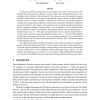Free Online Productivity Tools
i2Speak
i2Symbol
i2OCR
iTex2Img
iWeb2Print
iWeb2Shot
i2Type
iPdf2Split
iPdf2Merge
i2Bopomofo
i2Arabic
i2Style
i2Image
i2PDF
iLatex2Rtf
Sci2ools
108
click to vote
LPAR
2010
Springer
2010
Springer
Coping with Selfish On-Going Behaviors
A rational and selfish environment may have an incentive to cheat the system it interacts with. Cheating the system amounts to reporting a stream of inputs that is different from the one corresponding to the real behavior of the environment. The system may cope with cheating by charging penalties to cheats it detects. In this paper, we formalize this setting by means of weighted automata and their resilience to selfish environments. Automata have proven to be a successful formalism for modeling the on-going interaction between a system and its environment. In particular, weighted finite automata (WFAs), which assign a cost to each input word, are useful in modeling an interaction that has a quantitative outcome. Consider a WFA A over the alphabet . At each moment in time, the environment may cheat A by reporting a letter different from the one it actually generates. A penalty function :
| Added | 14 Feb 2011 |
| Updated | 14 Feb 2011 |
| Type | Journal |
| Year | 2010 |
| Where | LPAR |
| Authors | Orna Kupferman, Tami Tamir |
Comments (0)

